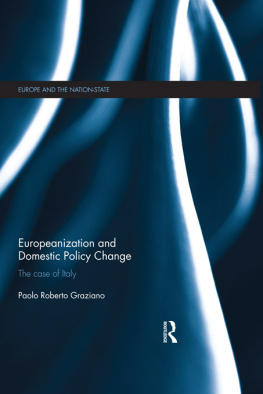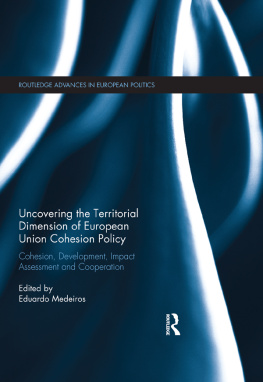Industrial and Regional Policies in an Enlarging EU
After years of near disrepute in official circles, Industrial Policy has made something of a comeback over the last few years and is now very much back on the agenda at national and EU levels, driven by concerns over globalisation, deindustrialisation, unemployment and perceived poor growth in the EU, all compounded by the impact of the current recession and credit crunch. Simultaneously, the European Commissions Fourth Report on Economic and Social Cohesion has kicked off the debate over challenges to cohesion, the shape of EU Cohesion policy beyond 2013, and how resources should be managed. This debate will find added momentum with the imminent mid-term review being launched by the Commission. Discussions over the success or not of the Lisbon Agenda, on-going debates over cluster policies, and recent developments in policy evaluation have also contributed to a burgeoning academic literature over the last eighteen months. This edited volume is especially pertinent given such developments and pulls together a diverse range of contributions from leading authorities in the field to add to these debates and to illustrate connections between them.
This book was published as a special issue of Policy Studies.
David Bailey is Professor of International Business Strategy and Economics at Coventry University Business School, UK. He has published extensively on industrial policy, economic restructuring and policy responses, globalisation, policy towards transnationals and FDI, and European integration and enlargement, (particularly EU Regional Policy).
Lisa De Propris is Senior Lecturer in Industrial Economics at the Birmingham Business School, UK. She has published extensively on clusters, cluster policies, European regional policy, competitiveness, industrial policy and creative industries.
Industrial and Regional Policies in an Enlarging EU
Edited by David Bailey and Lisa De Propris
First published 2009 by Routledge
2 Park Square, Milton Park, Abingdon, Oxon, OX14 4RN
Simultaneously published in the USA and Canada
by Routledge
711 Third Avenue, New York, NY 10017
Routledge is an imprint of the Taylor & Francis Group, an informa business
2009 Taylor & Francis
First issued in paperback 2013
Typeset in Myriad by Value Chain, India
All rights reserved. No part of this book may be reprinted or reproduced or utilised in any form or by any electronic, mechanical, or other means, now known or hereafter invented, including photocopying and recording, or in any information storage or retrieval system, without permission in writing from the publishers.
British Library Cataloguing in Publication Data
A catalogue record for this book is available from the British Library
ISBN13: 978-0-415-84893-0 pbk
ISBN13: 978-0-415-49822-7 hbk
Contents
MARK HART
JOHN BACHTLER AND GRZEGORZ GORZELAK
LISA DE PROPRIS
LESLIE BUDD
CHRISTOS N. PITELIS
DAVID BAILEY AND ALEX DE RUYTER
John Bachtler, Professor of European Policy Studies, and Director, European Policies Research Centre, University of Strathclyde Business School, UK.
David Bailey, Professor of International Business Strategy and Economics, Coventry University Business School, UK.
Leslie Budd, Reader in Social Enterprise, Open University Business School, UK.
Lisa De Propris, Senior Lecturer in Industrial Economics, Birmingham Business School, UK.
Alex De Ruyter, Professor of Public Service Management, University of the West of Scotland, UK.
Grzegorz Gorzelak, Professor of Economics, Centre for European Regional and Local Studies (EUROREG), Warsaw University, Poland.
Mark Hart, Professor of Small Business and Entrepreneurship, Aston Business School, UK.
Christos Pitelis, Reader in International Business and Competitiveness, and Director, Centre for International Business and Management, Judge Business School, University of Cambridge, UK.
Industrial and regional policies in an enlarging EU
After years of near disrepute in official circles, industrial policy has made something of a comeback over the last few years and is now very much back on the agenda at national and EU levels (Allen et al., 2006; European Commission, 2004, 2005, 2007a) driven by concerns over globalisation, deindustrialisation, unemployment and perceived poor growth in the EU. Simultaneously, the Fourth Report on Economic and Social Cohesion (European Commission, 2007b) has kicked off the debate over challenges to cohesion, the shape of EU cohesion policy beyond 2013, and how resources should be managed. This debate will find added momentum with the imminent mid-term review being launched by the Commission. Discussions over the success or not of the Lisbon Agenda, ongoing debates over cluster policies, and recent developments in policy evaluation (e.g. Bachtler & Wren, 2006) have also contributed to a burgeoning academic literature over the last 18 months.1 This book is especially pertinent given such developments and pulls together a diverse range of contributions to add to these debates and to illustrate connections between them.
The first article, by Hart (Evaluating EU regional policy: how might we understand the causal connections between interventions and outcomes more effectively?), presents a challenge to the ways in which regional policy in the member states and at the EU level has been evaluated thus far. Given the complexity of the policy framework and its objectives, Hart argues that existing evaluation methodologies are not only inappropriate but can create a real risk of misleading policy-makers in their search for identifying which programmes and initiatives are the most effective in tackling the scale of regional disparities now existing across the EU. For example, the search for an average effect of intervention, whether in terms of jobs created or gross value added (GVA) generated, does not adequately recognise the context within which policy operates. The article argues that only by attempting to adopt a realist evaluation framework can the discourse on effective regional policy be advanced. Examples are provided from a body of work on the evaluation of business support interventions in the UK as well as a broader study of the way in which regulations impact upon firm performance and growth. This methodological approach provides an opportunity for the evaluator to identify the causal mechanisms which connect the range of policy interventions and their outcomes. Overall, it has greater potential to inform the policy-maker as to what works and, more importantly, in what contexts.
Following on from this, Bachtler and Gorzelak (Reforming EU cohesion policy: a reappraisal of the performance of the structural funds) provide a timely reassessment of the effectiveness of EU cohesion policy on four levels: whether convergence is actually taking place; whether policy has made a durable contribution to convergence and regional restructuring; whether funds have been spent effectively; and whether there is a wider added value from spending. The article goes on to raise five key issues for the debate about reforming cohesion policy: first, the need for appropriate and forward-looking strategies; second, that insufficient attention has been paid to institutional capacity (a serious constraint on designing and implementing more sophisticated strategies especially in new member states); third, whether cohesion policy spending in the convergence regions should incorporate a greater degree of conditionality; fourth, the need to review the relationship between the EU and member states; and finally, the need to consider the very principles of the policy. The authors reflect by calling for a reconsideration of the concept of cohesion itself. They conclude by calling for cohesion to be understood in functional terms, rather than as an effort to reach convergence, and that this should involve economic, social and territorial dimensions.












